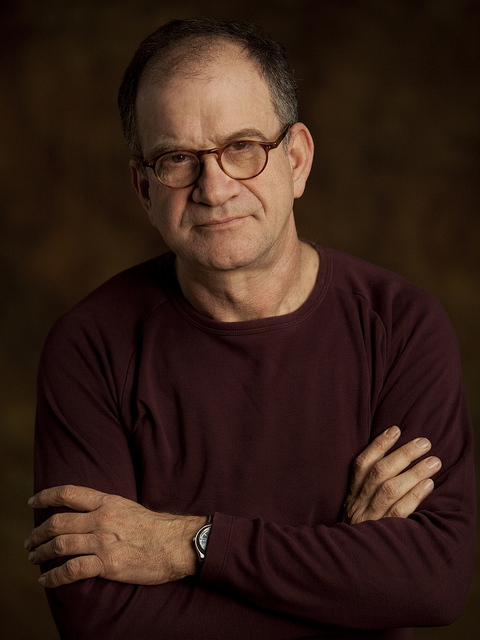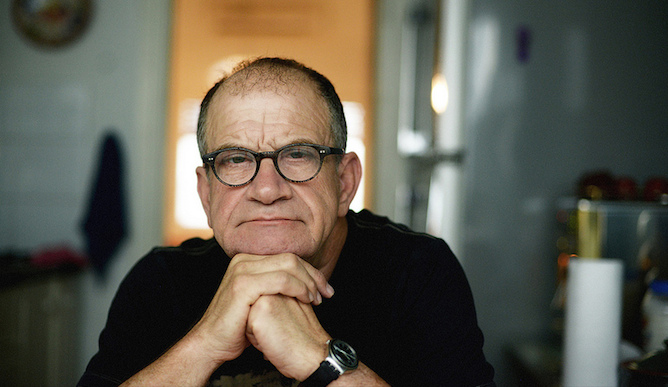On December 12, audiences across the world will mark the 10th anniversary of the passing of David Perlov, an Israeli filmmaker most of them haven’t even heard of.
In 39 different countries at 50 arty venues, 5,000 people will watch a movie inspired by one of Perlov’s masterpieces and produced by graduates of and students at the Sam Spiegel Film & TV School in Jerusalem.
This simultaneous screening in Israel and abroad of a 90-minute movie about Jerusalem, which is in the process of being translated into eight languages, including Chinese and Portuguese — is as much a tribute to the school and its founding father, Renen Schorr, as it is to Perlov.
This is because Schorr — the writer/director/producer at the helm of what Israelis refer to familiarly as “Sam Spiegel” since its establishment in 1989 – is responsible for a sea change in the Israeli film industry. (The original name, the Jerusalem Film School, was changed to “Sam Spiegel” in 1996, when the American-Jewish producer’s family started giving substantial annual donations.)
“We brought Israelis back to the movies,” Schorr, 61, tells ISRAEL21c.
Ashamed of their profession
Schorr explains that the school, which currently has 170 students, was born in the midst of a crisis.
“In the 1970s, Israeli audiences began to abandon home-grown cinema. First went the intelligentsia, and then the rest of the population followed suit. By the 1980s, the situation was so bad that only a few thousand people were watching Israeli movies. It was rare for a local film to be successful in Israel; and no Israeli films were shown abroad.”
People working in the Israeli film industry were ashamed of their profession.
At Beit Zvi in Ramat Gan – one of the two schools in the country that had a film department – students publicly complained that they were being treated like second-class citizens, Schorr recounts.
Their protest inspired Yitzhak Navon, then Minister of Education and Culture, to form a governmental committee to examine the matter. The upshot was the decision to establish a new national, independent film school, partially funded by the government. Navon got matching funds from the Jerusalem Foundation through Jerusalem’s legendary Mayor Teddy Kollek.
That was in the summer of 1989. By October, the school was ready to open its doors.
“All this took place in the midst of an intifada, followed by the Jewish holidays,” Schorr recalls. “And everyone, everyone — in the media, the film industry and academia — said it had no chance of succeeding.” On top of their other doubts, they scoffed at the idea of locating such an institution in Jerusalem rather than Tel Aviv.
Making Israeli film sexy
“It really annoyed me that everyone was putting down Jerusalem as being ‘beyond the hills of darkness.’ My political views have been left-wing ever since I was a young man, and I live in Tel Aviv,” Schorr says. “But I cannot stand the stereotypes spewed by Tel Aviv leftists. Jerusalem is ‘beyond the hills of darkness’? Come on. It’s an hour away from Tel Aviv, even closer than Haifa; and they wouldn’t say that about Haifa.”
Ironically, the media attention and public debate surrounding the issue “generated the largest registration for film studies in the history of the country,” he recalls. “We became swamped with applicants. It was insane. But it illustrated the public’s understanding that there was a need for something new – an alternative.”
This “alternative” was a shift in the way that filmmaking was taught.
“Up until that point, film in Israel was either on a low, pop-culture level – or political in an esoteric way – geared at the Tel Aviv café crowd. We understood that our role would be to create a dialogue between the films produced at the school and the audience – which Israeli cinema had lost.”
Using Alfred Hitchcock as a model, Schorr put an emphasis on the viewer.
“At our school, we weren’t going to ask how to make a good movie, but rather how to reach the viewer – how to fill the air with electricity; how to make Israeli film sexy; and how to move the viewer to tears, laughter, excitement, tension.”

- Schorr set out to create new standards for Israeli film. Photo by Vardi Kahane
Israeli film had never been taught this way before, says Schorr. There had been a condescending attitude toward the people who actually buy tickets at the box office.
“We decided that the way to tackle this was to have our students make many short movies, so that they could practice the very thing that Hitchcock talked about,” Schorr says. “And we would look at each film and ask the student who made it: ‘Does this work emotionally?’”
Gradually, Schorr says, “We created a new language.”
Got the whole world talking
“When we came out with movies made by the first batch of students, we surprised everybody, including ourselves,” he continues. “What we had done during the incubation period of the school was to produce movies that looked and felt different. They had stories and protagonists we hadn’t seen before, grappling with dilemmas. They showed new landscapes and lighting. They had a new kind of energy. And that reached the audience – not only in Israel. Within three years, the whole world was talking about us.”
It still is, given the number of international awards Israeli films have won or been nominated for since then.
As in the case of successful Israeli startups, is there something special about young Israeli filmmakers?
“They begin their studies at an older age than students elsewhere in the world, because of serving in the army and then taking their ‘compulsory’ treks to the Far East. They are thus more mature, and have interesting stories to tell,” Schorr says.
“In addition, they are resourceful and have a sense of humor. So, while short Israeli films are not technically as good as those from many schools abroad, they are complex and original, which makes them stand out. When we compete in international festivals against films made on far higher budgets, we beat them in almost every competition.”
The startup comparison doesn’t end there. At the end of 2011, the Sam Spiegel School inaugurated an incubator – only the third of its kind in the world – where Israeli and foreign scriptwriters are mentored by well-known Israeli filmmakers for the purpose of producing full-length films. The writers, whose average age is 35, hail from the Ivory Coast, Sri Lanka, Zambia, Iceland, Guatemala, Mexico, Peru and elsewhere.
This fledgling project, with a donation-driven annual budget of $400,000, has produced a dozen films. Of those 12, says Schorr, seven have been already been filmed. The final scripts will compete for an $80,000 prize at the Jerusalem Film Festival.
Now, Schorr is developing a joint academic program with the Hebrew University for overseas students, predominantly from the United States, to study film in Israel under the cream of the crop of the local industry. The program will be taught in English and is slated to begin in the fall of 2014.
“Our role is to be more than a school,” Schorr says. “It is to be a significant player in the Israeli film industry — and Israeli culture as a whole – to create new standards.”
















